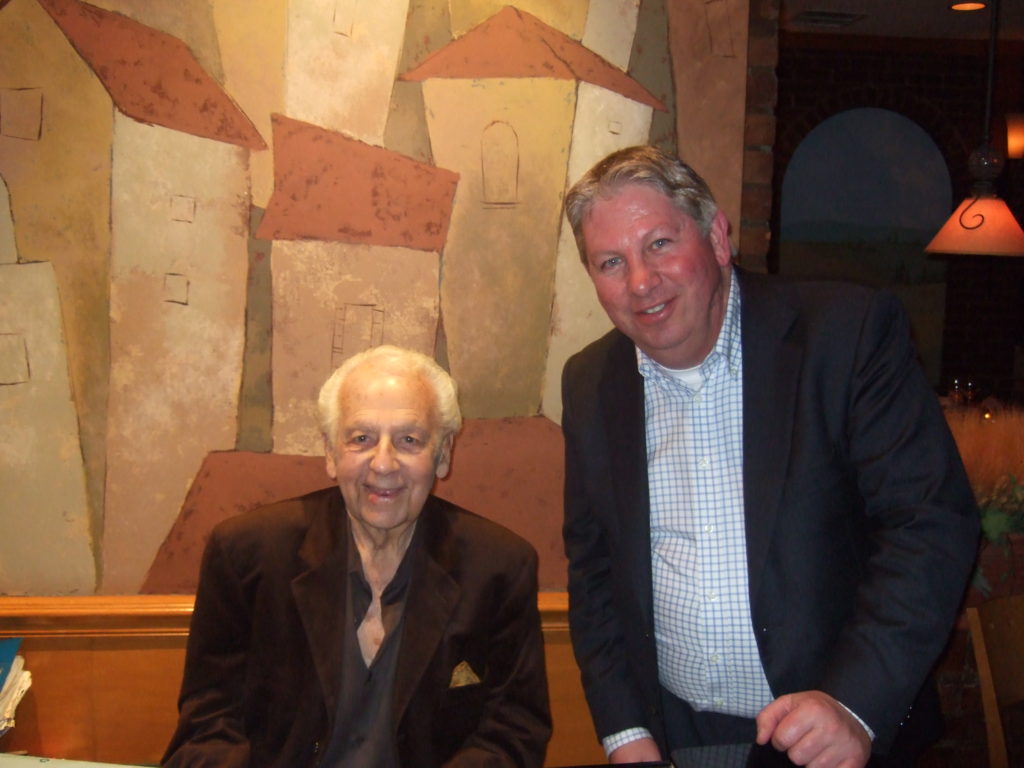Pianist Irving Fields Mixed Bagels and Bongos

Two weeks after his 101th birthday, pianist and composer Irving Fields passed away August 20, 2016 in Manhattan. He was perhaps the longest working musician in the world. At the age of hundred, he used to play the piano several nights a week at Nino’s Tuscany restaurant in Manhattan. Irving Fields became known by fusing Jewish tunes, jazz, and popular songs with Latin music.
Born as Isidore Schwartz in 1915 New York City to Jewish immigrants, Irving Fields started working as a pianist in the thirties during the years of the Great Depression. In this time of high unemployment, he started playing piano in resort hotels in the Catskills Mountains, and then he found work as a pianist on cruise ships sailing from New York to Havana, capital city of Cuba. In Havana, Irving Fields listened to the great Cuban orchestras, and developed his love for Latin music. Attracted by pictures from palm trees and beaches in travel magazines, Irving decided to settle in Miami Beach and performed in hotels playing dinner music, and did sessions with local orchestras.
After joining the army, he began the Irving Fields Trio, with a bass and a drummer, and started composing his own songs. In 1947, his song Miami Beach Rhumba became a big success by versions of Kay Kyser, Freddy Martin, Carmen Miranda, and even by the popular band leader Xavier Cugat. During the Latin craze trend in the 40s, Irving Fields was at the right time and place, and soon Miami Beach Rhumba was followed by the number one hit song Managua, Nicaragua (1947) recorded by big band leader Guy Lombardo, and ten years later by Chantez-Chantez (1957) by singer Dinah Shore.
 In 1959, the Irving Fields Trio recorded the album Bagels and Bongos blending popular Jewish tunes with Latin rhythms such as Bei Mir Bist Du Schön as a mambo, Havannah Negila a paso doble, and I Love You Much Too Much a rhumba. The album became a big hit all over the world, and was followed by the albums More Bagels and Bongos (1960), Pizzas and Bongos (Italian traditionals), Champagne and Bongos (with French standards), and Bikinis and Bongos (with Hawaiian music). Every song was mixed with a Latin beat, which turned out to be a story of success.
In 1959, the Irving Fields Trio recorded the album Bagels and Bongos blending popular Jewish tunes with Latin rhythms such as Bei Mir Bist Du Schön as a mambo, Havannah Negila a paso doble, and I Love You Much Too Much a rhumba. The album became a big hit all over the world, and was followed by the albums More Bagels and Bongos (1960), Pizzas and Bongos (Italian traditionals), Champagne and Bongos (with French standards), and Bikinis and Bongos (with Hawaiian music). Every song was mixed with a Latin beat, which turned out to be a story of success.
After the success with his trio in the sixties, Irving Fields went back working as a solo pianist on cruise ships again, where he sailed the whole world, and finally settled as a music entertainer in restaurants, from 2004 six nights a week in Nino’s Tuscany, Manhattan. This would become the place, where he started his second career.
In the last decade, several films appeared about Fields playing piano on YouTube. These films form a good impression of his talent, wisdom, and humor. Although Irving Fields was not a user of a computer or the Internet, he did compose the YouTube theme song.
Regarding my research about the influence of Jewish tunes in American popular song, I contacted Irving Fields, and then I received several handwritten letters from him. At my birthday March 2010, I met Irving Fields and his lovely wife Ruth in person in Nino’s Tuscany restaurant, where he entertained the guests with his music. From my letters, he knew that I should visit him this special evening. To my surprise, he welcomed me with a newly composed personal anniversary song. When listening to his music and talking to him, I knew that I was close to one of the last persons, already in his nineties, who could tell me first-hand about the history of popular music in the Tin Pan Alley period before the second World War.

Irving Fields and Niels Falch at Nino’s
Of course, I also asked him about his secret for longevity, and he replied with more than ten rules. The first three rules for longevity are; (1) Have a sense of humor (you’ll never get ulcers), (2) Think of these three magic letters before you make a decision: L.T.D. Look, Think and Do, and (3) Be the first to say “hello” with a smile on your face and a friendly glow. Following these rules during his life, Irving Fields became ultimately 101 years young.
Even U.S. President Donald J. Trump admired Irving Fields, and shared one of his secrets for longevity: “Irving has said that work is a blessing, especially when you like your work. He loves his work, and that love is evident in his music. Irving is a great pro.”
Irving Fields will be remembered as the pianist who blended bagels and bongos, although he never had a way to play a bagel…
You can listen to over 30 recordings by Irving Fields on the Recorded Sound Archives website by clicking here.
RSA Guest Blogger, Niels Falch, is a PhD candidate at the University of Groningen in the Netherlands and is currently writing a dissertation on the influence of Jewish music in American popular songs.
Please note, due to copyright some of these recordings may only play for 45 second snippet to give the user a taste of what this music sounded like back in the day, if you are interested in full access considering applying for Research Station Access. Access to Research Station is limited to educators, students and serious researchers.